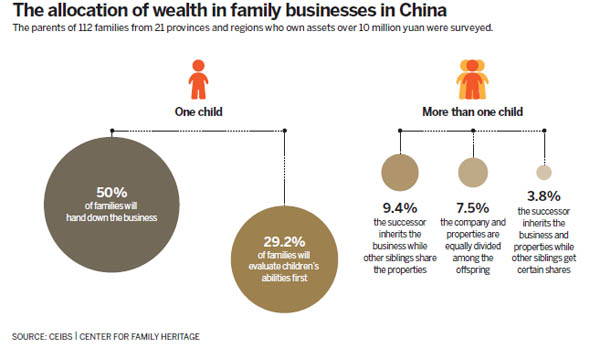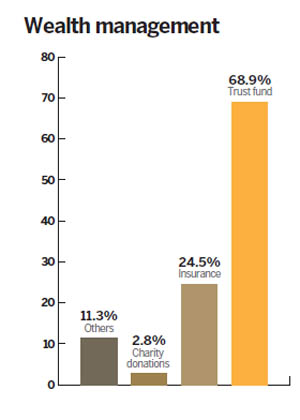From creating to innovating
Updated: 2015-08-01 04:17
By YU RAN in Shanghai(China Daily USA)
|
|||||||||
|
 |
|
The hot seat: Many second generation business owners have proved their worth at the helm with their modern and innovative ideas. LU PING / CHINA DAILY |
The next generation owners of family businesses are no longer just focused on manufacturing like their predecessors — they want a piece of the global market
One of the first things that Pan Jianzhong did when he took over Juyi Group, his family’s shoe-making business, was to introduce machines to the production process, and he had to do so with his own money in order to prove a point to his mother.
Afraid of taking risks and ignorant of the benefits of workplace automation, Pan’s mother was initially skeptical about his venture. However, it didn’t take too long before she discovered that the machines were able to produce better quality products at a much faster rate.
“I believed the only way to increase the size of the company was to use machines to manufacture products of more-consistent quality in less time. My mother was quite conservative and was afraid to take the risk of spending a large amount of money on expensive machinery, which she thought was unlikely to bring in higher profits,” said Pan.
Juyi Group now employs about 5,000 people in Wenzhou of Zhejiang province and is able to produce more than 10 million pairs of shoes a year for clients all over the world, all credit to Pan’s foresight. The company now also uses computer-guided stitching machines and laser printers that work 10 times faster than traditional handcrafting.
Family businesses such as Pan’s sprouted in the 1980s when China opened its doors to the world, and they are now entering the next phase where the descendents of the founders are taking over the reins. According to a 2011 report by the All-China Federation of Industry and Commerce, 75 percent of family businesses will be making a transition over the next few years.
“Entrepreneurs in China emerged alongside the nation’s reform and opening up, therefore most family businesses are now undergoing the succession process from the first to the second generation,” said Zhang Weijiong, vice president of China Europe International Business School (CEIBS), who was speaking at the CEIBS 4th China Family Heritage Forum 2015 on July 11.
People like Pan — a second generation business owner who has successfully transformed his company from a purely manufacturing entity to a brand with a global footprint — will be crucial to China’s economy as the majority of private-sector enterprises are classified as family businesses.
Keys factors
One of the biggest challenges for such businesses, as illustrated in Pan’s case, is for the new generation to convince their parents of the viability of their modern ideas. After all, first-generation entrepreneurs who made their fortune by the sweat of their brows producing goods like shoes, clothes and electrical appliances would know little about modern business strategies.
Experts say that it is important the transition between the two generations is a gradual one that includes a clear handing over of business techniques, leadership principles and financial management. Xu Lixun, the executive director and president of Huamao Group, said at the CEIBS forum that other factors such as family culture and values, as well as effective inter-generational communication are important for ensuring a smooth succession.
“I have been teaching my son about having the right views about wealth, independent spirit, creative abilities as well as the importance of maintaining the family’s governing structure,” Xu said.


- Gala promotes gender equality
- Trafficked woman appeals to be left alone, continue her life
- Wreckage discovery shouldn't disrupt search: MH370 families
- 3,000 students attend pre-exam session in huge hall
- 38.7b yuan in State assets recovered in campaign
- China closely watches recovery of Boeing debris: spokesman

 Top 10 international destinations for Chinese millionaires
Top 10 international destinations for Chinese millionaires
 Rainstorm affects 940,000 in South China
Rainstorm affects 940,000 in South China
 Do you take all your paid leave?
Do you take all your paid leave?
 National Art Museum of China displays Polish folk art
National Art Museum of China displays Polish folk art
 Chinese soldiers in parades
Chinese soldiers in parades
 US Marines Corpos soldiers demonstrate martial arts
US Marines Corpos soldiers demonstrate martial arts
 World's largest radio telescope being built
World's largest radio telescope being built Elvis Festival pays tribute to the King of Rock 'n' Roll
Elvis Festival pays tribute to the King of Rock 'n' Roll
Most Viewed
Editor's Picks

|

|

|

|

|

|
Today's Top News
Professor accused of spying out on bond
Chinese defense concerned about US moves in South China Sea
Chinese named in test-taking scam deported from US
Baidu to buy back shares worth $1b
Former military leader Guo Boxiong expelled from CPC, to face justice
Pair to face poaching charges related to death of popular lion
Amazon wants air space for delivery drones
Embassy continues its work in aftermath of car bombing
US Weekly

|

|







